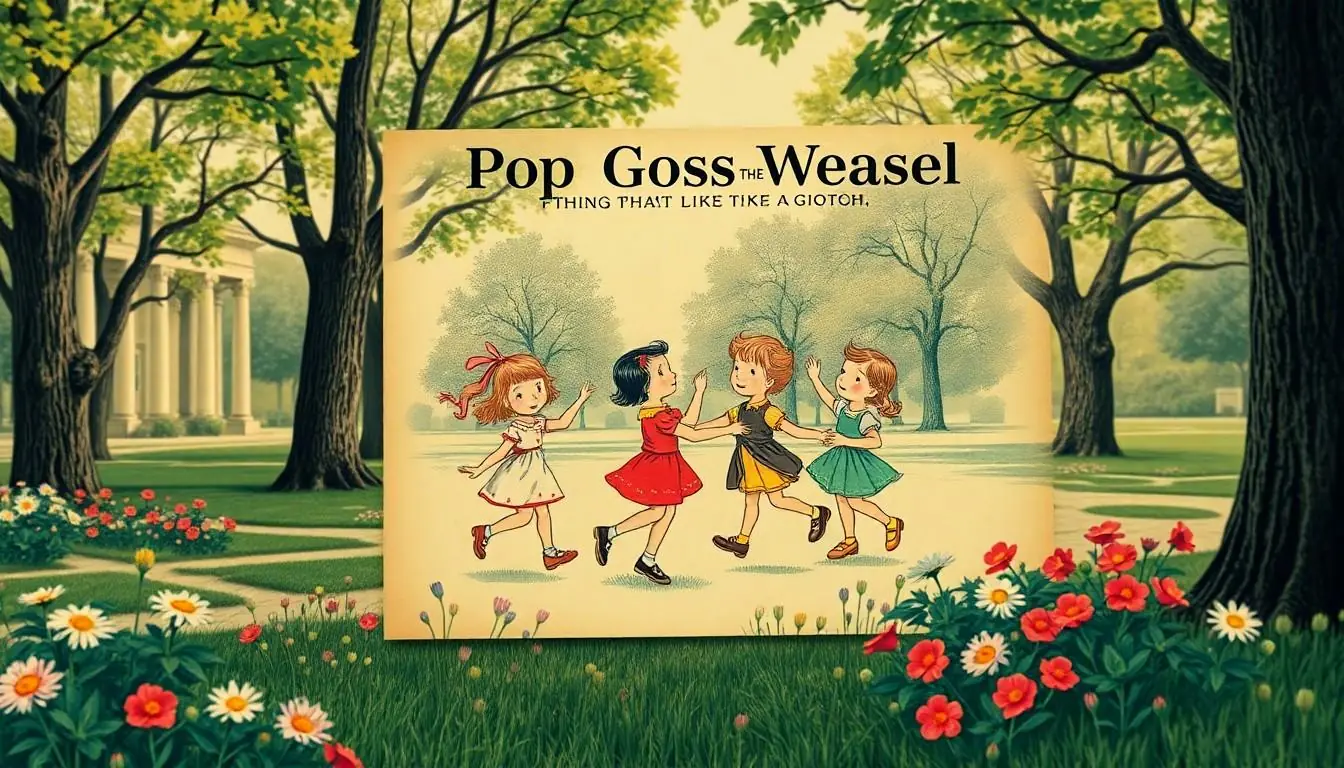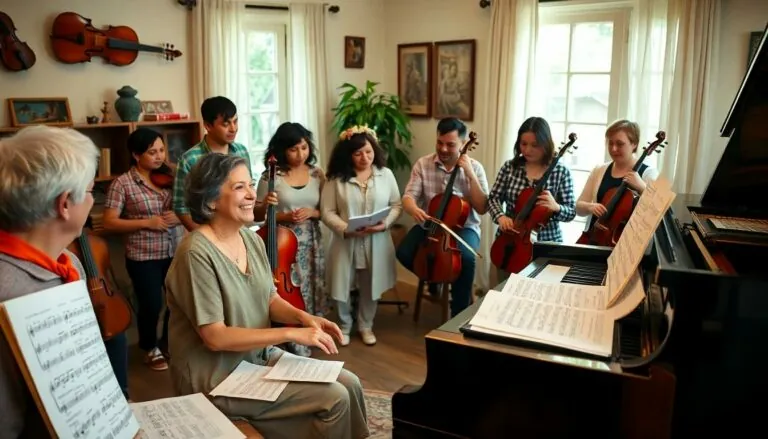Table of Contents
ToggleFor anyone who’s ever felt the irresistible urge to join in on a classic nursery rhyme, “Pop Goes the Weasel” holds a special place in their heart. This catchy tune has been a favorite for generations, not just for its playful lyrics but also for the joyful chaos it inspires. Imagine a room full of kids, laughter echoing, as they all eagerly await that moment when the music hits just right—it’s pure magic.
But what about the sheet music? Whether you’re a seasoned musician or just looking to impress at the next family gathering, having the right sheet music can make all the difference. It’s time to dust off that old piano or grab your ukulele and dive into the whimsical world of “Pop Goes the Weasel.” With the right notes in hand, anyone can unleash their inner maestro and keep the fun rolling.
Overview of Pop Goes The Weasel
“Pop Goes the Weasel” is a traditional nursery rhyme popular among children and families. Originating in the early 19th century, this playful tune features catchy lyrics that foster imagination and enjoyment. The song’s simple melody allows musicians of all skill levels to play it easily.
Sheet music for “Pop Goes the Weasel” is widely available, making it accessible for various instruments such as piano, guitar, and recorder. Musicians can choose from different arrangements, which cater to both beginners and experienced players. Online platforms provide downloadable versions, allowing for instant access to the sheet music.
The song’s repetitive structure enhances its appeal among young audiences. Children engage actively by singing along and participating in musical games. The lyrics encourage movement and interaction, which adds to the fun experience. Parents and educators often use the song to teach rhythm and melody.
Cultural variations exist, with different verses appearing in multiple countries. Each adaptation retains the central theme of a playful interaction, enriching its global significance. “Pop Goes the Weasel” continues to be a favorite in children’s programs, emphasizing its timeless charm and ability to bring joy.
Interest in this nursery rhyme reflects its longstanding presence in music education. Learning to play “Pop Goes the Weasel” lays a foundation for musical development. Embracing this playful tune contributes to creativity and early childhood development, reinforcing the lasting legacy of the song.
History of the Song

“Pop Goes the Weasel” boasts a rich history that captures the essence of playful interactions across cultures. Originating in the early 19th century, it features a catchy melody and whimsical lyrics that invite engagement and fun.
Origin and Early Versions
The earliest known versions of “Pop Goes the Weasel” emerged in Britain, with various interpretations recorded in nursery rhyme collections. The phrase “pop goes the weasel” may refer to a weasel’s action, with “pop” signifying an unexpected movement. Throughout the 1800s, the song evolved, embedding itself in popular culture, often sung as part of children’s games. Its straightforward structure made it appealing for communal singing, as families gathered to enjoy this delightful tune. Early sheet music appeared during this period, allowing musicians to spread the song’s joy further.
Cultural Impact Over the Years
Throughout the decades, “Pop Goes the Weasel” maintained its charm, inspiring adaptations across different cultures. Variations emerged in several countries, each reflecting local traditions but sharing the central theme of playful interaction. Notably, it appeared in literature and music, solidifying its place in children’s entertainment. The song contributed to music education, featuring in curriculum materials that promote musical learning and creativity. Popular adaptations in films and television continue to celebrate its legacy, ensuring that “Pop Goes the Weasel” remains embedded in global culture.
Popular Arrangements of the Sheet Music
Numerous arrangements of “Pop Goes the Weasel” showcase its versatility across various instruments.
Traditional Notations
Traditional sheet music often features simple melodies for instruments like piano and recorder. Musicians find these notations accessible, making the song easy to learn and enjoy. Standard keys typically include C major, ensuring that it resonates well with young audiences and developing musicians. Additionally, various arrangements highlight different sections of the song’s structure, enabling players to experiment with tempo and style. Many music books include these classic scores alongside illustrations and lyrics, enriching the learning experience.
Modern Adaptations
Modern adaptations of “Pop Goes the Weasel” cater to a broader audience by featuring complex arrangements. These versions might include orchestral arrangements, jazz interpretations, or even pop renditions. Musicians frequently adapt lyrics to fit contemporary themes, allowing the song to resonate with newer generations. Digital platforms provide access to various adaptations, encouraging creative exploration for performers. Furthermore, modern notations may incorporate dynamics and articulation, elevating the performance quality and enhancing musical expression.
Tips for Playing Pop Goes The Weasel
Playing “Pop Goes the Weasel” becomes enjoyable with the right approach and techniques, making it accessible for musicians at any skill level.
Recommended Instruments
Piano offers a straightforward avenue with simple chord progressions and familiar melodies. Guitar can attract players through its versatility and ability to accompany sing-alongs. Recorder serves as a great choice for young learners, introducing them to music basics. Ukulele, with its light weight and easy chord structures, remains a popular alternative for aspiring musicians. These instruments provide a fun way to explore the playful nature of the song, encouraging interaction and enhancing enjoyment during performances.
Where to Find Quality Sheet Music
Finding quality sheet music for “Pop Goes the Weasel” is straightforward. Numerous online platforms offer a variety of arrangements suitable for different instruments. Websites like MusicNotes and Sheet Music Plus feature downloadable scores. Both sites provide options for piano, guitar, recorder, and ukulele.
Local music stores often carry popular nursery rhyme collections. These stores typically include printed versions of well-known songs. Some communities also hold music events, presenting the chance to discover sheet music firsthand.
YouTube channels dedicated to music education frequently share free arrangements. Musicians can learn to play along, enhancing the enjoyment of the song. Additionally, many educational websites offer downloadable formats for teachers and students.
Digital platforms like IMSLP or MuseScore provide access to public domain versions of various compositions. Users can explore free sheet music, making it easy to find what they need without spending much.
For those seeking modern interpretations, platforms like Spotify and Apple Music might also provide links to sheet music. Many artists now showcase their own arrangements, giving musicians fresh takes on the classic tune.
Social media groups focused on music often share resources and tips. Engaging with fellow musicians can reveal overlooked sources for quality sheet music. Each of these options ensures easy access to the beloved nursery rhyme, inviting everyone to enjoy making music.
“Pop Goes the Weasel” continues to enchant audiences with its playful spirit and catchy melody. Its rich history and cultural significance highlight the song’s ability to foster creativity and joy across generations. With accessible sheet music available for various instruments, anyone can join in the fun and experience the delight this nursery rhyme brings.
As musicians explore different arrangements and interpretations, they not only engage with the song but also contribute to its legacy. Whether played at family gatherings or educational settings, “Pop Goes the Weasel” remains a timeless piece that invites laughter and participation, ensuring its place in the hearts of many.






